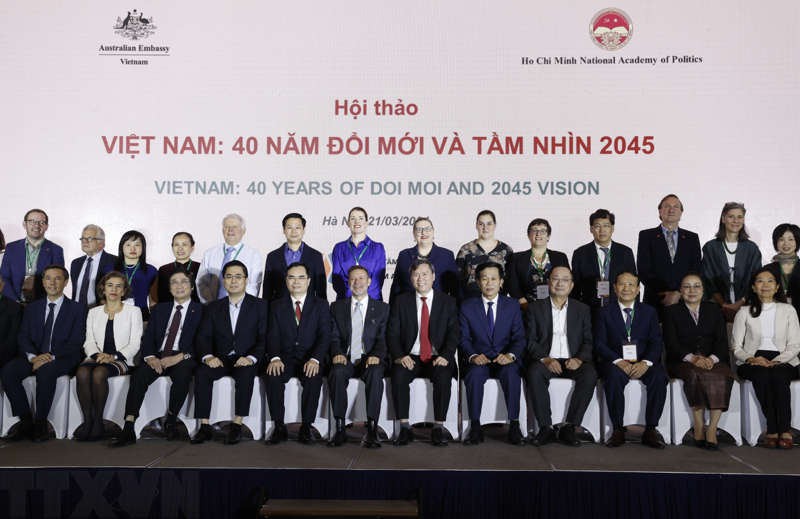The Ho Chi Minh National Academy of Politics (HCMA) and the Australian Embassy in Vietnam jointly hosted a workshop titled "Vietnam: 40 years of Doi Moi and 2045 vision" on March 21 in Hanoi, convening over 200 delegates from Party agencies, government ministries, research institutes, academia, and international financial institutions from both countries.
This workshop, forming a crucial part of a strategic research series supported by the Vietnam Australia Centre (VAC), aims to develop policy analysis and recommendations on pivotal development issues to inform Vietnam’s strategic vision for 2045. It also contributes insights for the review of 40 years of Doi Moi and the formulation of the 14th National Party Congress Documents.
Professor Dr. Nguyen Xuan Thang, member of the Politburo and President of HCMA, underscored the significance of the Doi Moi research series and the fruitful collaboration between Australian and Vietnamese experts. This collaboration, he emphasized, strengthens the robust relationship between the two countries, cultivated over the past five decades, including the recently signed Comprehensive Strategic Partnership.
Mr. Thang highlighted Vietnam's extraordinary development journey over nearly four decades of Doi Moi, transitioning from a centrally planned economy to one propelled by market mechanisms. He also noted Vietnam’s proactive engagement in comprehensive integration, driving industrialization, modernization, and fostering distinctive Vietnamese creativity, which resulted in remarkable historical achievements.
Commencing as a backward, impoverished agricultural nation with a modest GDP of $26.3 billion in the early reform years, Vietnam ascended from the ranks of low-income countries in 2008. Its economy has since burgeoned to $430 billion, ranking as the 35th largest global economy. By 2023, GDP per capita surged to $4,300, marking a nearly 58-fold increase from the early years of reform.
Moreover, Vietnam's transition from a closed economy to the 22nd largest global trading partner underscores its economic openness. In 2023, the country recorded nearly $700 billion in total import-export turnover and a record-high foreign investment disbursement of $23 billion, a notable achievement amid global market contractions and disruptions in supply chains.

H.E. Andrew Goledzinowski, Australian Ambassador to Vietnam, expressed his admiration for the contributions of nearly 40 Australian and Vietnamese experts involved in the research. He reaffirmed Australia's commitment to supporting Vietnam in realizing its 2045 vision, stressing the unparalleled strength of their relationship and the intent to collaborate on mutual interests outlined in the Comprehensive Strategic Partnership.
Ambassador Goledzinowski emphasized Vietnam's significance to Australia, not only economically but also as a stable, peaceful country pivotal in the Indo-Pacific region. He highlighted the recent elevation of bilateral relations during Prime Minister Pham Minh Chinh's visit to Australia, emphasizing the parallels between Australia's past economic reforms and Vietnam's Doi Moi, signaling a shared path towards progress.
Sharing Australia's experience, Ambassador Goledzinowski recounted how the country's leaders initiated economic reforms in the mid-1980s, akin to Vietnam's Doi Moi, fostering competitiveness and success. He stressed the importance of creating new energy to sustain progress, echoing Vietnam's current aspirations.
The workshop featured presentations on pivotal topics central to Vietnam’s development, organized into three Parallel Sessions: Understanding Global Megatrends and Transforming Public Governance System in Vietnam; Vietnam's Financial Sector and Urban Development; Escaping the Middle-Income Trap and Embracing Sustainable Development.
A panel discussion followed with Australian academics from Curtin University, RMIT University, and the University of Adelaide, along with representatives from the United Nations Development Program (UNDP), the World Bank (WB), the Asian Development Bank (ADB), and Oxfam.









 Google translate
Google translate